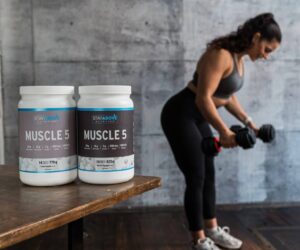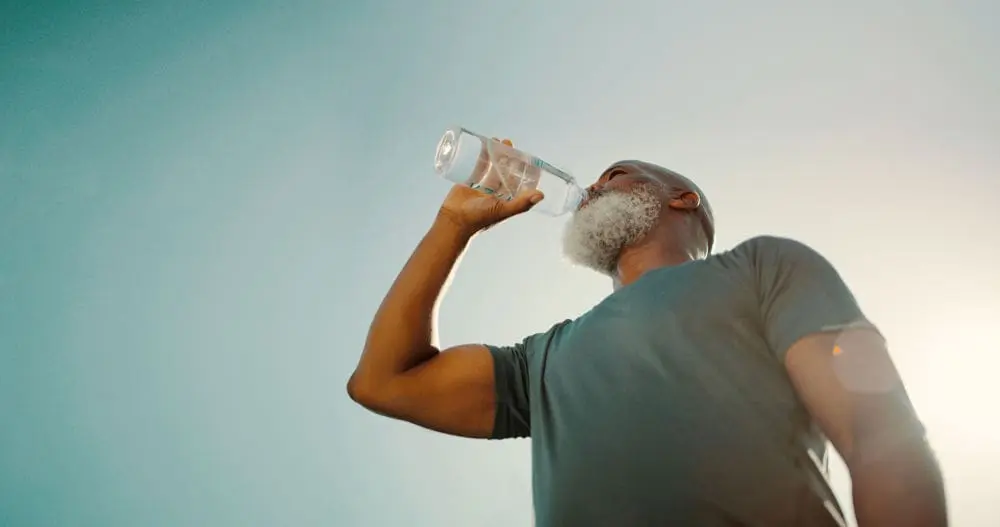

Worried about your susceptibility to viruses, such as COVID-19? Want to boost your immune health, but don’t know how? You are not alone. For many of us, information on how to boost your immune system and protect yourself against viruses is overwhelming, and it can be difficult to separate facts from fiction. Research is clear on that poor eating habits, physical inactivity, stress, and inadequate sleep weaken your immune system and predispose to viral infections, more severe complications, and suboptimal vaccination response (1-9). Unfortunately, many of us moved less, ate unhealthier and slept worse during the COVID-19 pandemic because of social isolation (e.g., restricted access to parks, gyms, and sporting facilities), boredom, anxiety, and stress (10-15). Luckily, these behaviors can be changed, and you can boost your immune system simply by leveling up your lifestyle. In this article series we have provided some of the best, scientifically based and easy-to-follow tips for you to build your immunity without magic bullets or marketing gimmicks.
Balanced Food Intake
Healthy nutrition is one of the most effective ways of boosting your immune system. A well-balanced diet may be your best bet to protect against the common flu and other viruses. Research has shown that eating too much (overnutrition) or too little (undernutrition/malnourishment) may impair your immunity, and dietary restrictions are generally considered just as bad as unhealthy foods (16). In other words, while over-eating like Homer Simpson may slowly kill you, fad diets are certainly not sustainable and may cause serious health complications.
Supplements
Although there are no magic pills to boost your immunity, nutrient deficiencies, such as protein, calcium, vitamin D and omega-3 fatty acids, have been associated with worse outcomes and higher mortality rates from COVID-19 (16). There is also scientific evidence that a number of vitamins (A, B6, B12, folate, C and E) and trace elements (zinc, copper, selenium, iron) are important for the human immune system and reduce the risk of infections (17, 18). Antioxidants are obviously key for your cellular defense and exist naturally in all cells, including your immune system, but the clinical benefit of dietary antioxidants on immunity (beyond vitamins A, C and E) is still under debate (19). Generally, supplements offer targeted ways to combat nutrient deficiency and should be considered, especially by vegans, athletes, elderly, and patients (20-23).
Water Intake
“Be water my friend” is more than just a philosophical statement provided by late Bruce Lee. Staying hydrated is obviously key for most body functions and the absence of water is lethal within days (24); thus, it’s critical to maintain hydration, especially during viral infections (25). Adequate water intake for an adult is generally between 2-3 liters per day accounting for all dietary sources, such as tea, water, fruits, etc. (24).
Expert Recommendations
Eating a well-balanced diet, maintaining your nutritional needs, and staying hydrated are therefore your best options to keep your immune system healthy and lessen side effects of viral infections, including COVID-19 (16). A registered dietician may tailor your diet to your exact needs according to your metabolism, physical activity levels, recommended daily allowance (age and sex-specific), and any health considerations.
However, adhering to these few, easy-to-follow principles will certainly go a long way:
Ever wonder what type of exercise is best for your immune system? First, it is important to remember you don’t need to become an Olympian to reap the extraordinary benefits of exercise. As a matter of fact, research is clear on that moderate-to-vigorous training is preferred over the intense training that athletes do when boosting your immunity (26). Regardless of type of training (cardio or weights), exercise mobilizes billions of immune cells that are ‘primed’ and thus provides exchange between your organs and the circulatory system (27). Over time, this improves immune function, enhances vaccination efficacy, and lowers inflammation (26-31).
Being active protects against respiratory tract infections and acute respiratory distress syndrome (32, 33), specifically from viral infections such as influenza, rhinovirus and herpes viruses (34, 35). On the opposite end of the activity spectrum, low physical activity increases the risk for viral complications, such as severe COVID-19 outcomes (1, 36). Plus, inactivity increases your chances to develop other more severe health issues (5), so it is not only in your immunity’s best interest, but also your overall health’s best interests to get active.
So, what about the type of exercise? Well, each major mode provides slightly different benefits to your immune system (26, 37), and it’s therefore recommended that you do a mixed exercise regimen (cardio and weights) on a weekly basis:
Importantly, keep it simple, vary your exercise regimen and make it fit within your weekly schedule so you can sustain it. Don’t get discouraged if you can only do 1-2 sessions per week or if you are a self-proclaimed ‘weekend warrior’. Any physical activity is better than none and even small amounts (5-10 min per day) have profound benefits to your immunity and health (38). It is literally an investment in your future!
Beware, workaholics and hibernators! Optimal sleep is an underestimated pillar of health, but one that is as vital for your survival and immunity. Your circadian rhythm dictates the sleep-wake cycle and regulates many important health functions, and prolonged disturbances of this cycle, such as sleep loss, may compromise your immunity (4). Surprisingly, both short and long duration sleep are associated with greater risk of severe disease and death (39). Sleep studies have shown that short sleepers (≤ 5-7 h per night) and long sleepers (> 8 or 9 h per night) have a 12% and 30% greater risk of dying, respectively, than those sleeping 7 to 8 h per night (39). In other words, the evidence is clear that you need to aim for 7 – 8 h sleep per night to optimize your health and keep your immune system strong (40). No more, no less!
Over 30-40% of individuals report problems with initiating or maintaining sleep and treatments must be weighed according to benefit-to-risk ratios, with non pharmacologic approaches being preferable vs. drugs for improving sleep quality (41). The long-term, clinical benefits of using pharmacological treatments are limited and alternative approaches may be cheaper and more sustainable in the long run (42). For example, certain plant-based products may have less ‘hangover’ effects and be safer vs. traditional sleep medications (43), although more research is needed in this field. Cognitive-behavioral approaches, such as stimulus control therapies, relaxation therapies, and sleep hygiene education, are therefore recommended for improving your sleep (41).
Here are ten science-based, natural ways of promoting good sleep:
We all feel stressed at times, but does it affect our immunity? Science has provided a pretty firm answer on that and it appears that chronic stressors, such as losing your job, divorce or disease (for example, anxiety relating to the COVID-19 pandemic), suppress immunity and may be linked to elevated levels of stress hormones such as cortisol (44). On the other hand, brief ‘natural’ stressors, such as the anxiety you feel going into a final exam or the anticipation you feel when taking that game-winning shot, provide temporary stress and allows for the immune system to adapt. Stress management is therefore a key pillar of your health and your ability to regulate life stressors is vital. Mindful meditation, relaxation, breathing techniques and exercise are excellent ways to reduce stress, and we suggest that you set aside some time in your day for these practices (45). Mornings are peaceful and an opportunity to get clarity, focus and inspiration for the day, but you can practice your ‘Zen’ at any time!
References:
If you are not satisfied with your purchase, please contact us at info@stayabovenutrition.ca. We will endeavour to improve your experience with our products.
Check out our FAQ for more information.
We currently ship our products anywhere within Canada. Purchases are typically processed and shipped within 48 hours. Depending on your location, items will arrive within 2-5 business days.
Check out our FAQ for more information.